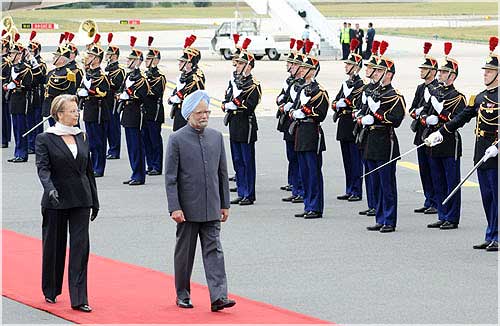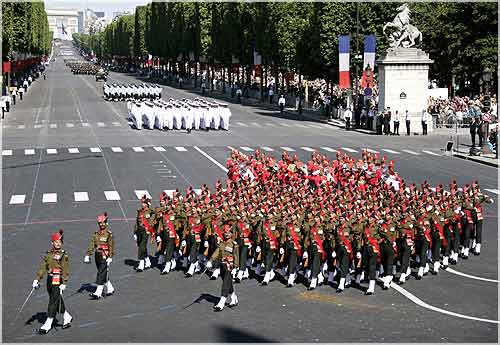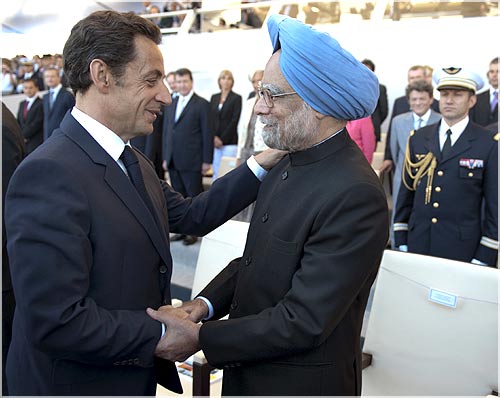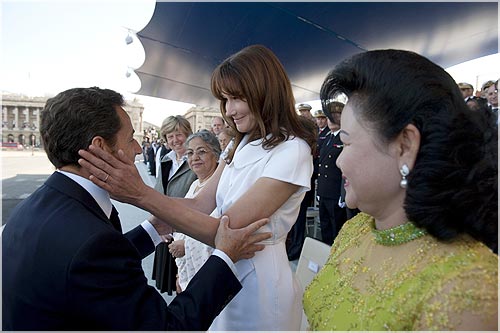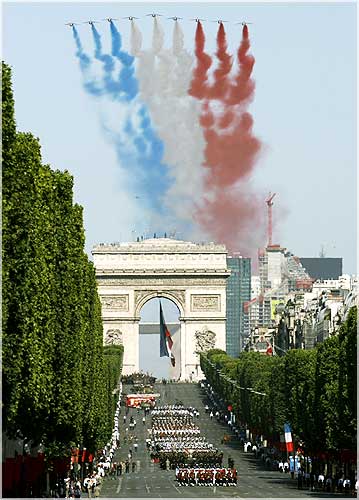 | « Back to article | Print this article |
Rare French privilege for Dr Singh
In a rare honour for India, Prime Minister Manmohan Singh was on Tuesday the Chief Guest of Honour at the French National Day celebrations, witnessing an impressive parade, in which a contingent of Indian soldiers also marched to the soul stirring music of Saare Jahan Se Achchha.
Dr Singh became the first Indian leader to be the chief guest at the French celebrations, reflecting the closeness of ties between the two countries. Sarkozy was the chief guest at the Republic Day celebrations last year and his invitation to Dr Singh is a gesture of reciprocation.
Maratha Regiment marches in Bastille Day parade
France does not have the custom of inviting foreign heads of government or state to be the chief guest and this honour has been bestowed on foreign leaders only on few occasions. The event, during which the military parade opened with a detachment of 400 soldiers from the three defence services of India, bore a striking resemblance to the Republic Day celebrations in Delhi.
The Indian soldiers paraded down the 1.5-km stretch of Champs Elysees, along with French soldiers, to the sound of Indian martial music played by a 90-member military band. Maratha Regiment, one of the oldest infantry regiments of the Indian Army created in 1768, was part of the parade. The Maratha Regiment was deployed in Europe during the Second World War.
Impressive show by India's defence forces
The soldiers participated to the tunes of Sare Jahan Se Achchha and Kadam Kadam Badhaye Jaa. While the Army band played Bhopal, Hanste Lusai and Veer Sipahi to quick march, the Navy marched impressively to the tunes of Jai Bharati and INS Vikrant. The Air Force band was greeted lustily by the parade watchers as they did a quick march.
The event also witnessed an impressive fly past. The Indian contingent's participation at the parade marked the commemoration of the Indian Army's association with its French counterpart during the two World Wars.
Indian and French forces fought the Germans
Under the British command, Indian soldiers along with the French forces, as part of two Allied Divisions, fought Germans in the northern French town of Neuve-Chapelle in March 1915.
Bastille Day, as the French National Day is called, commemorates the storming of the Bastille prison by the people, which took place on July 14, 1789 and marked the beginning of the French Revolution.
The Bastille prison symbolised absolute and arbitrary power of Louis XVI's ancient regime. With the capture of Bastille, the people sent out a strong signal that the King's power was no longer absolute.
Bastille Day marks the end of absolute monarchy
Though only seven prisoners were lodged in Bastille when it was taken over, the event became a symbol of liberty and the fight against oppression for all French citizens and marked the end of absolute monarchy and emergence of a sovereign nation and subsequently the creation of a Republic in 1792.
Bastille Day was declared as a French national holiday on July 6, 1880, on the recommendation of Socialist politician Benjamin Raspail. At this year's celebrations, Cambodian President Hun Sen, who is on a bilateral visit to France, is also the Guest of Honour along with German President Horst Kochler.
